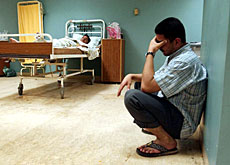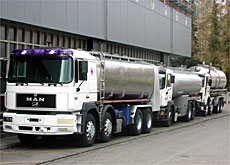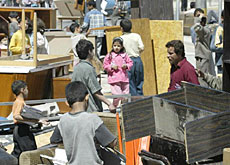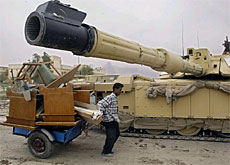Iraq hangs in the balance

The chief spokesman for the International Committee of the Red Cross in Iraq, Roland Huguenin, has warned that the country is at a dangerous crossroads.
In an interview with swissinfo, he said Iraq risks collapsing into chaos unless urgent action is taken to repair its shattered infrastructure.
The neutral agency, which is based in Geneva, was the only humanitarian organisation to keep expatriate staff in Iraq throughout the war.
Huguenin told swissinfo about the challenges aid workers now face in Iraq and his personal experience of the war, which cost the life of one ICRC worker.
swissinfo: The war prompted warnings of a humanitarian crisis in Iraq. Now that the conflict is winding down, what’s your assessment of the situation?
Roland Huguenin: Iraq is at a potentially dangerous crossroads in the sense that much of the basic infrastructures need to be restored… For example, the country’s telephone network was completely destroyed, which has paralysed the social and economic life of the country.
This has dramatic consequences for the people and for business. In addition, the electric grids have also been paralysed and we don’t know how or when they’ll be repaired and then there are the water problems… everything is destroyed on a very basic level.
All of the ministries have been burnt to the ground, except the oil ministry, which was protected by the Americans. So we have to get this whole country working again and if we don’t see immediate and tangible signs that something is happening, it could become very dangerous and create very serious social conflicts. So I hope this country can get out of this situation and finally see better days ahead.
What are the most urgent problems faced by the Iraqi people and aid workers?
R.H.: There are a certain number of problems which need to be urgently resolved, because all other work depends on them.
This entire country needs to be reorganised as a result of the incredible waves of bombing and destruction that took place during the war, as well as the fact that the country’s economic and social infrastructures have been destroyed.
But without basic services such as water and electricity, it’s impossible to get this country working again and that’s why we will be concentrating our attention on re-establishing drinking water systems and bringing in temporary water sources for vital locations, such as hospitals.
It will take a considerable effort, but the ICRC has been working on Iraq’s water system for 12 years so we’ve got a lot of experience in doing this.
This also allows us to work closely with local public utilities officials to ensure that access to water is restored, which will help prevent outbreaks of disease. In the cities where there was considerable damage, such as Basra, the water system is now more or less working.
Baghdad is a very large city with a complicated water network so we’re working on the central pumping stations, including the ones that supply the suburban areas… so it’s an enormous amount of work.
What has the coalition’s response been to the ICRC’s recent appeal for the occupying forces to restore law and order, particularly in Baghdad?
R.H.: Since the very first day of the American ground attack on Baghdad, we’ve been in contact with the American forces and asked them to protect the hospitals. Those that were protected from the beginning weren’t attacked but that was only one or two… some were attacked and completely devastated by looters while others were partially destroyed.
A lot of the ransacking stopped when the troops stepped up security. We have to recognise that the American soldiers are part of fighting force – not a police force – and they didn’t see their duty as maintaining law and order. But in reality, as the occupying force in the region, it is their responsibility to ensure public safety under the Geneva Conventions.
Is it possible to say how many civilians have been wounded or killed in this conflict?
R.H.: On a countrywide scale, it’s impossible to say because we have not been present in all of the cities.
In Baghdad, in the beginning, there were around 100 people wounded per day as a result of the bombing. During the first day of the American ground assault on Baghdad, there were around 100 people wounded per hour and the hospitals were completely inundated with casualties.
In the final days of the ground attack, there were a few hundred wounded civilians per day. If we tried to add it all up, based on a daily average, it would be several thousand, not including the rest of the country.
On Tuesday, the ICRC in Geneva held a memorial service for your colleague, Vatche Arslanian, who was killed in crossfire last week as the American forces closed in on Baghdad. How do you cope being a witness to so much suffering and death?
R.H.: I think that’s something we have to be ready to face. You have to accept when you go on a mission of that type that you have to keep a clear distinction between personal emotions and the requirements of one’s profession in order to remain as objective and pragmatic as possible and to be able to perform.
I must admit it was very difficult in the last days of the ground offensive in Baghdad, when there was a direct hit at the hotel where the international journalists were staying and five journalists were seriously wounded, two of whom subsequently died. On the same day, our own colleague was attacked and killed in a car… it all made it very, very difficult because we felt under constant threat.
You’ve been in Iraq throughout this whole conflict and you’ve had to work as both a spokesperson and as an aid worker. What has your personal experience been of the war?
R.H.: I joined the ICRC because I was familiar with Iraq… I had worked in the country in the 1980s and 1990s on various projects. So I had personal ties to this country and to its people and that’s the reason I came.
I hoped, during the time that the inspectors were proceeding with their work, that it would actually bring about a diplomatic solution. I really hoped that there would be no war, even if I admit that it was just wishful thinking.
When the war actually happened, it was an entirely different matter. We were working under very high pressure… We had kept a small core team of delegates in the country and we had declared ourselves ready to stay during the conflict. But suddenly, we were in a non-stop emergency situation, which was a different experience.
If you could change anything about the way in which you were able to work and the way the war transpired, what would it be?
R.H.: I think it was difficult to keep an eye on what was going on throughout the country. In practice, we were present and we hope we made difference for a few people by providing equipment to hospitals here… but then the problems just got out of hand.
The fact that the telephone exchanges were all destroyed was a problem for millions of people, who had no way of connecting with their families. This was not really foreseen and there was no way to replace it and establish a means of communication with the outside world, except for a few satellite phones, which we didn’t have enough of.
The fact that the hostilities were taking on a shape that was difficult to cover… there was very little international media coverage of what was happening in places like Najaf, Karbala and Nasiriyah and I think the nature of the hostilities that took place there will need to be investigated in the future.
By chance, we went to Al Hillah, which is 100 kilometres south of Baghdad, when a major offensive had occurred that left hundreds of very severe casualties among the civilian population, and we declared it publicly.
I called it a horror and it launched a large media reaction worldwide. But I just don’t know what was going on in the other cities… I wish we had been able to have a wider view on what was going on in the whole country, but it was physically not feasible.
swissinfo, Anna Nelson, Frédéric Burnand and Mohamed Chérif in Geneva
The chief spokesman for the International Committee of the Red Cross in Iraq, Roland Huguenin, has warned that the country risks collapsing into chaos if urgent action isn’t taken to repair its shattered infrastructure.
He cited water and electricity as basic services that must be fixed before other services, such as telephone networks, could be restored.
Huguenin estimates that thousands of civilians were wounded or killed in Baghdad as the result of coalition bombing and the American ground offensive on the capital.
He also said the majority of government offices had been burnt to the ground, except for the oil ministry, and that the country’s social and economic systems had been destroyed.

In compliance with the JTI standards
More: SWI swissinfo.ch certified by the Journalism Trust Initiative




You can find an overview of ongoing debates with our journalists here. Please join us!
If you want to start a conversation about a topic raised in this article or want to report factual errors, email us at english@swissinfo.ch.